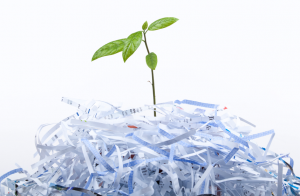Recycling paper
Recycling paper has become a regular activity of modern life, a good habit that seems secondary nature to most of us by now. Even big business has embraced it, judging from the catalogs and shelves of the major office supply outlets. They have wisely realized that there is money in being "green." Environmentally conscious consumers can now choose from a wide selection of printing and copying papers with anywhere from 35percent to 100percent recycled content. 
But is this enough? The computer age was supposed to usher in the paperless society, but that is just not our reality. Filing cabinets still bulge with paper and people continue to print hard copies of e-mails and other documents for the purpose of security, backup and verification. In fact, we consume more paper than ever before, recycled or not. And we will continue to avidly consume paper in the future.
We have taken the notion of paper from trees for granted and rarely think that there are other proven technologies and sources for making paper. We can begin to seriously consider other ways of producing paper and one of those age-old ways is paper from plant fiber, not wood pulp. A number of plant fibers are positioned to be our next alternative paper: jute, ramie, kenaf, flax and hemp.
